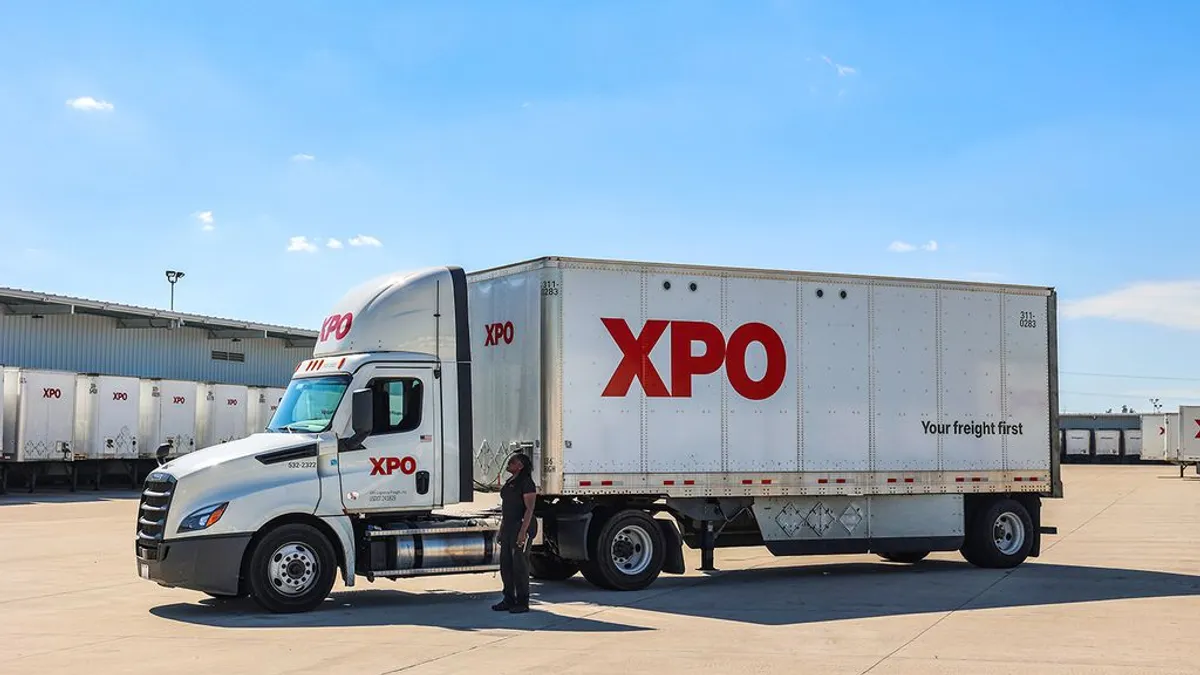Dive Brief:
- With the CARES Act passed and relief money primed to be sent to individuals and businesses, President Donald Trump tweeted on Tuesday that his next goal is an infrastructure bill he has long touted.
- Trump said the fourth phase of coronavirus relief could be a stimulus in the form of a $2 trillion package that would conceivably cover many of his infrastructure goals, which include fixing, improving or adding to America's roads, bridges, tunnels, ports and airports.
- Efforts to negotiate such a bill fell apart in April 2019, when Trump walked out of a White House meeting with House Speaker Nancy Pelosi. But the trucking industry has continued to push for a bill that will fund and fix highways, bridges and tunnels.
With interest rates for the United States being at ZERO, this is the time to do our decades long awaited Infrastructure Bill. It should be VERY BIG & BOLD, Two Trillion Dollars, and be focused solely on jobs and rebuilding the once great infrastructure of our Country! Phase 4
— Donald J. Trump (@realDonaldTrump) March 31, 2020
Dive Insight:
The current political climate, with estimates of unemployment surging, could drive Congress to compromise on infrastructure. And the financial environment is attractive too, Trump said, even on the heels of the $2.2 trillion relief package.
Trump tweeted that with interest rates for the U.S. at practically zero, "this is the time to do our decades long awaited Infrastructure Bill. It should be VERY BIG & BOLD, Two Trillion Dollars, and be focused solely on jobs and rebuilding the once great infrastructure of our Country! Phase 4."
There is wide and bipartisan agreement on the need to fix the nation's infrastructure.
The American Society of Civil Engineers' 2017 Infrastructure Report Card set the national grade for infrastructure at D-plus — the same grade the United States received in 2013 — "suggesting only incremental progress was made over the last four years toward restoring America’s infrastructure."
The ASCE evaluated 16 categories of infrastructure in the four-year report, with grades ranging from a B for rail to a D-minus for transit. Roads got a D and bridges got a C-plus.
The American Trucking Associations (ATA) has also pushed for Trump and Congress to pass a bipartisan, wide-ranging bill. The ATA said the poor infrastructure causes the average commuter to waste 42 hours a year sitting in traffic. Road and bridge damage also causes wear and tear on cars and trucks.
"Between time lost and the $1,600 in vehicle damage and wasted gas the average American is saddled with, we are no longer at the brink," said Chris Spear, ATA president and CEO, in an April 2019 news release. "We are living in a crisis situation."
One of the major sticking points in negotiations has been how to fund such a bill.
The ATA said it hoped Trump and Congress pass an increase in the federal fuel tax. The federal fuel tax is 18.4 cents per gallon of gasoline and 24.4 cents per gallon of diesel fuel. Those tax rates have not been raised since 1993, and the ATA, the AAA and the U.S. Chamber of Commerce said an increase in the tax would help fix national infrastructure and increase the Highway Trust Fund, most of which is covered by taxes on gasoline, diesel and heavy-duty tractor sales.
Grover Norquist, president of Americans for Tax Reform, a Washington, D.C.,-based taxpayer advocacy group he founded in 1985, told Transport Dive early in March that he would oppose an increase in such taxes, as would many Republicans in Congress.
But Trump's tweet indicates he is willing to borrow the money to fund the bill. His tweet was welcomed by Sen. John Barrasso, a Republican from Wyoming, the chairman of the Senate Committee on Environment and Public Works, who said on Twitter that his chamber's bill "will cut red tape so projects can get done better, faster, cheaper, and smarter ... At a time when our nation is dealing with an economic crisis from this pandemic, fixing America’s roads and bridges is a great way to create jobs and support businesses."






